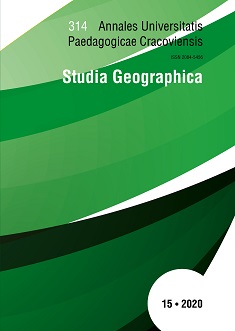Slums as a cultural tourist attraction on the example of Brazilian favelas in Rio de Janeiro
DOI:
https://doi.org/10.24917/20845456.15.2Keywords:
Brazil; favela, Rio de Janeiro; slums; cultural tourismAbstract
One of the inherent parts of Brazilian reality are favelas, the districts of poverty. Not a long time ago did they not exist on the road maps. They were treated with disdain and indifference by the community. They are, however, difficult to ignore, as they are an inseparable part of Brazil’s reality. It is estimated that in Rio de Janeiro alone, there are around 750 favelas, in which every second inhabitant of the 6 million community of Rio de Janeiro lives. In this article the issue of what slum tourism is and the related to it moral and ethical behaviour of tourists was discussed. The studies show that every second tourist using the local travel agencies’ offers in Rio de Janeiro chooses the optional trip to the favelas. The elaboration shows examples of the slum tourism’s offers, which turns out to be one of the most alluring aspects of familiarizing with the city for the tourists from around the world.
References
Alejziak, W. (2008). Metodologia badań w turystyce. W: R. Winiarski (red.), Turystyka w naukach humanistycznych. Warszawa: Wydawnictwo Naukowe PWN, 140–164.
Buczkowska, K. (2008). Turystyka kulturowa. Przewodnik metodyczny. Poznań: Wyd. AWF.
Buczkowska, K. (2008). Cultural Tourism – Heritage, Arts and Creativity. Poznań: Wyd. AWF w Poznaniu, 47, 50.
Buczkowska, K., Malchrowicz-Mośko, E. (2012). Etyczne dylematy turystyki kulturowej. Turystyka Kulturowa, 12.
Davis, M. (2009). Planeta Slumsów. Warszawa: Instytut Wydawniczy Książka i Prasa.
Fainstein, S., Judd, D. (1999). The Tourist City. Yale University Press.
Frankfort-Nachmias, C., Nachmias, D. (2001). Metody badawcze w naukach społecznych. Poznań: Zysk i S-ka.
Frenzel, F., Blakeman, S. (2015). Making Slums Into Attractions: The Role of Tour Guiding in the Slum Tourism Development in Kibera and Dharavi. Tourism Review International, 19.
Gandecka, A. (2016). Ostatnia enklawa autentyczności? Slumsy jako atrakcja turystyczna. Turystyka Kulturowa, 6.
Hernandez‐Garcia, J. (2013). Slum tourism, city branding and social urbanism: the case of Medellin, Colombia. Journal of Place Management and Development, 6/1.
Jędrysiak, T. (2008). Turystyka kulturowa. Warszawa: Polskie Wydawnictwo Ekonomiczne.
Konieczna-Domańska, A. (2008). Biura podróży na rynku turystycznym. Warszawa: Wydawnictwo Naukowe PWN SA.
Kowalczyk, A. (2008). Turystyka kulturowa: spojrzenie geograficzne. Warszawa: Wydział Geografii i studiów regionalnych UW.
Mika, M. (2007). Formy turystyki poznawczej. W: W. Kurek (red.), Turystyka. Warszawa: Wydawnictwo Naukowe PWN, 198–232.
Mikos von Rohrscheidt, A. (2010). Turystyka kulturowa. Fenomen, potencjał, perspektywy. Poznań: Wyd. Kul-Tour.pl.
Nowak, I. (2013). Podróże marzeń. https://podroze.onet.pl/ciekawe/jak-wyglada-zycie-w-fawelach-brazylii-czy-nastanie-moda-na-slumsy-i-co-zmieni-mundial/ngskhs0
Olczyk, M. (2013). Moralne aspekty turystyki. Teologia i Moralność, 8/1(13).
Pluta, A. (2017). Droga do Rio. Historia polskich emigrantów. Warszawa: Wydawnictwo Naukowe PWN SA.
Rohrscheidt, A. (2008). Turystyka kulturowa. Fenomen, potencjał, Perspektywy. Gniezno: Wydawnictwo KulTour.
Sikora, J. (2015). Etyczne aspekty turystyki kontrowersyjnej w warunkach komercjalizacji rynku turystycznego. W: G. Godlewski, M. Zalech (red.), Turystyka kontrowersyjna na współczesnym rynku podróży – formy, uwarunkowania, skutki. Biała Podlaska: AFW.
Slikker, N., Koens, K. (2015). Breaking the Silence: Local Perceptions of Slum Tourism in Dharavi. Tourism Review International, 19.
Spirou, C. (2011). Urban tourism and urban change. Cities in a global economy. New York: Routledge.
Stasiak, A. (2011). Współczesna przestrzeń turystyczna. W: M. Durydiwka, K. Duda-Gromada (red.), Przestrzeń turystyczna. Czynniki, różnorodność, zmian. Warszawa: Uniwersytet Warszawski, Wydział Geografii i Studiów Regionalnych, 39–51.
Stasiak, A. (2015). Turystyka kontrowersyjna jako emanacja gospodarki doświadczeń. W: G. Godlewski, M. Zalech (red.), Turystyka kontrowersyjna na współczesnym rynku podróży – formy, uwarunkowania, skutki. Biała Podlaska: AWF.
Raporty
The Challenge of Slums – raport z 2003 r. opublikowany przez ONZ-HABITAT – pierwsze w pełni globalne badania nad ubóstwem miejskim.
Raport World Tourism Organization UNWTO, Tourism Highlights. Edition 2016
Downloads
Published
Issue
Section
License
The submission of a paper to be published is synonymous with an agreement to transfer the copyright free of charge from the author to the publisher. The author also agrees to permit the publisher to publish the paper in printed form, open access online form, digital library form and other digital platforms with which the publisher has or will have a publishing agreement. Furthermore, the author agrees to not limit the number of copies that may be printed or issued by the publisher. In the case of co-authored papers, it is assumed that the corresponding author is authorized to represent the remaining co-authors in this respect. Authors are requested to sign a copyright declaration.

